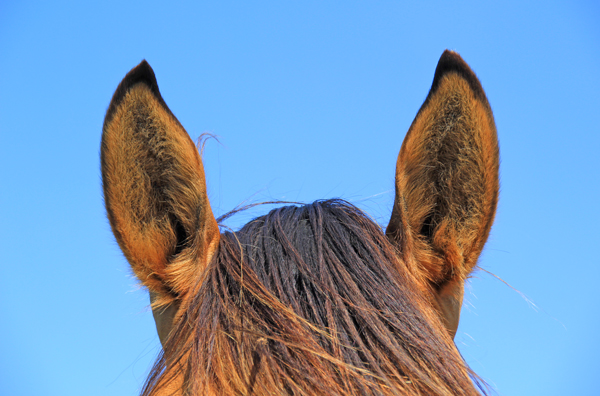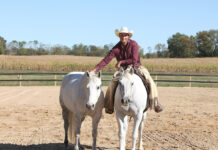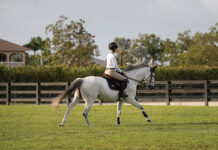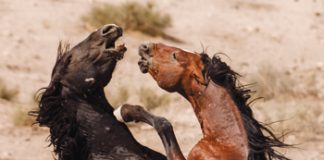
Q: My mare had a serious ear infection that required weeks of treatment. Now she’s extremely head shy. It’s an ordeal to bridle her. If anything comes near her ears she panics. Otherwise, she’s a sweet, wonderful mare. Can I get her to trust me again?
First, make a commitment to spend 5 minutes twice a day gently massaging and rubbing your mare’s neck with an open hand. In the beginning do not make any attempt to reach for her ears. At the end of each session, give her a treat. After about a week, increase the length of each session and expand the area where you’re rubbing her neck. As you approach the ear zone, she’ll raise her head to elude you. Calmly follow her with your open hand and continue rubbing her neck. Then quit and give her the treat. Never force the issue. Over time, without making a big ordeal, your hand will get closer to your mare’s ears in a non-threatening manner. The treat is a reward for being so trusting.
If this seems unfeasible for your schedule and level of patience, then consult with a professional trainer. There are horsemen and horsewomen who specialize in non-aggressive methods of gentling horses and communicating a sense of trust. They can then demonstrate their methods to you so you can follow up at home.
Finally, you may choose avoid the issue in hopes that your mare will, over time, return to her non-head shy behavior. When bridling, use a headstall that will unbuckle easily, so you can merely flip it over the top of her neck, slide it into place and re-buckle the cheekpiece. I realize this sounds like a bother, but it’s a small price to pay for having a relationship with an otherwise lovely animal.
–Cindy Hale







This is great advice!! My gelding had an eye infection that he had to be sent to a specialist for. He’s fine now, but when he had the infection, he had to where a special mask to keep him from getting anything into/scratching his eye. We didn’t know it until afterward, but the mask was irritating the base of his ear and he had an infection there too! All it is is a scar now, but he is extremely head shy as well. Whenever I go to put fly repellant in his ears, there’s always a big fight. I think I’ll apply some of these tips! Thank you HC!
My horse doesn’t like his ears touched but he’s not scared, just annoyed. He doesn’t like being groomed either and will try to bite me. If I tried the rubbing neck method he’d just bite me. Any advice?
Good advice.I once rode a horse that used to do jousting and he was a little sensitive.
Another great reading material.
I had a paint gelding that was very head shy too. I just took my time with him in the round pen. I would sit on the mounting block and he would walk over to me. Once he got use to me & trusting I would then slowly rub up his neck until I was able to rub all over his face. I left the ears for last. In about 2 months I was able to touch all over his face & even hold his ears. It’s just takes time & trust.
Oh, so thats how you solve it! The horse that I exercise for a friend always does it!
Thank you so much, this will help!
Thanks for the advice. My horse hurt his right ear when trail riding with his first owner. I think he said he got it caught in vines or branches; I can’t remember how it happened, but that his ear was more sensitive than usual. maybe this will make bridling less stressful for the both of us. Thanks! 🙂
/good advise. I will tell my friend about this article.